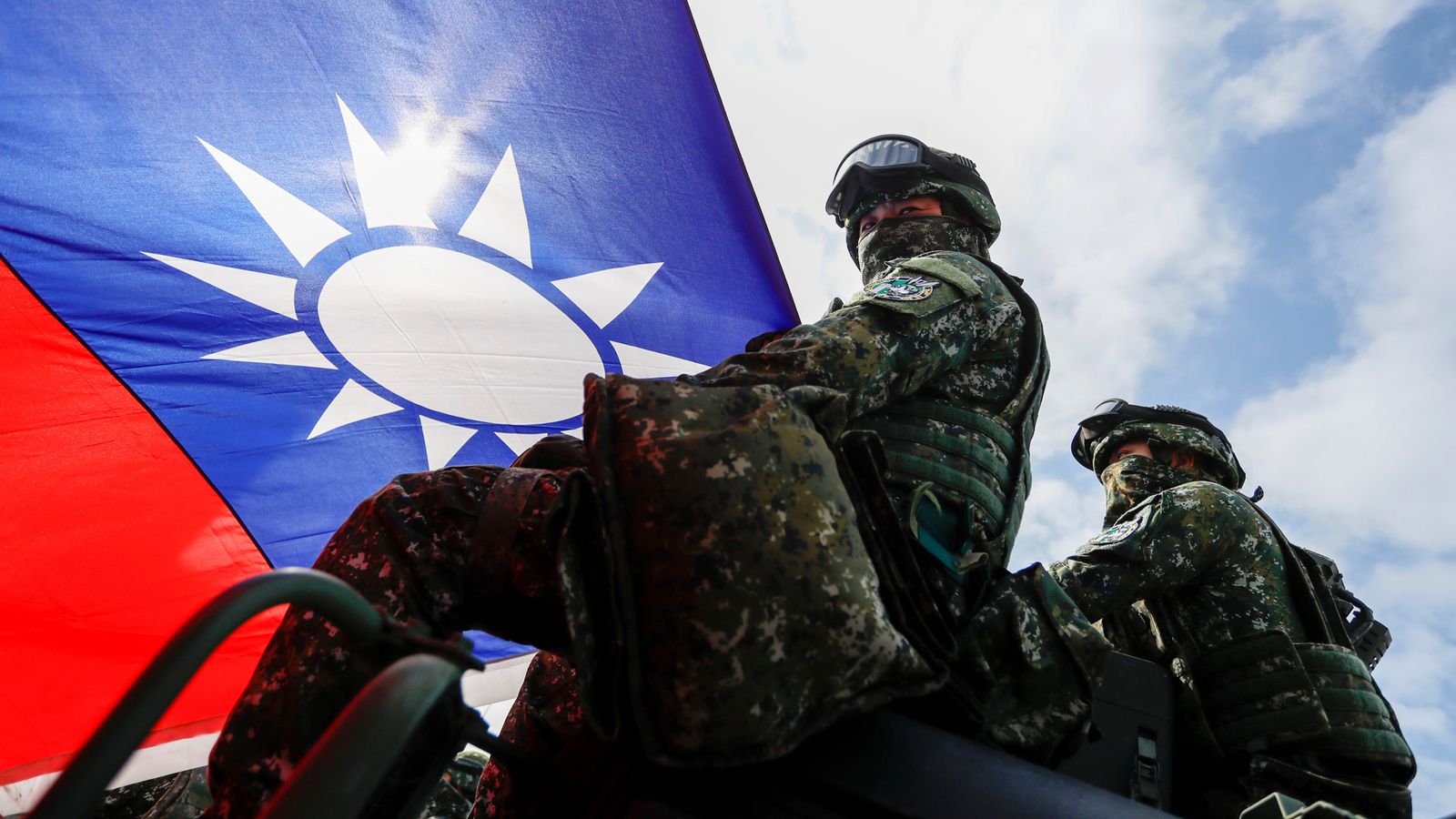Taiwan’s foreign minister has said he believes China is now “more likely” to invade Taiwan to distract from leader Xi Jinping’s domestic problems.
Speaking exclusively to Sky News in his first sit-down interview of the year, Joseph Wu set 2027 as the key date such action will most likely happen.
His words come at a time when tensions across the Taiwan strait are the highest they’ve been for many years, with China now flying fighter jets towards Taiwanese airspace on a daily basis.
Mr Wu also said that the current “status quo” arrangement, in which Taiwan is self-governing but does not officially declare independence, “might not last forever”, in a rare acknowledgement that the island might one day either be assimilated by China or become an independent country.
Taiwan is a democratic, self-governing island that China sees as its own.
Despite it having never been controlled by the governing Communist Party, bringing Taiwan under Chinese control has been described by President Xi Jinping as at the “core of China’s core interests”.
Mr Wu acknowledged that “the situation in the last year compared to the two previous years is much worse”, but said: “To me, 2027 is the year that we need to watch out for.”
Read more:
Could Taiwan be the next Ukraine?
China shows off jets once shrouded in secrecy
Watch how civilians are preparing for war in Taiwan
“In 2027, Xi Jinping is likely to go into his fourth term, and, if in his previous three terms he cannot claim any achievement during his office, he might need to think about something else for him to claim as his achievement or his legacy.
“If you look at the Chinese situation right now, the economy is going down. People are not happy, the real estate business seems to be melting down.
“If Xi Jinping cannot change the situation domestically in China, you might want to resort to a use of force or creating a crisis externally to divert domestic attention or to show to the Chinese that he has accomplished something.
“We are concerned that Taiwan might become his scapegoat.”
Please use Chrome browser for a more accessible video player
‘A tiny little accident might spark major war’
Chinese fighter jets are now flying towards Taiwanese airspace and crossing the so-called ‘median line’ – the unofficial maritime border – on a daily basis.
The number increased five-fold between 2020 and 2022 with the highest ever daily count recorded just three weeks ago.
Mr Wu said that the “worst case scenario” happening is now “more likely” than in previous years, and described how precarious the situation can be.
“Look at the proximity of the Chinese aircraft to our aircraft,” he said.
“If they cross the 24 nautical miles zone, some of our weapons systems might have to target those Chinese aircraft, and that might spark an accident, even though it might not be intentional for the Chinese pilots to cross the 24 nautical miles.
“Very often, you see the sum of a tiny little accident might spark into a major war.
“We worry that might happen.”
The only thing to prevent that sudden escalation now, he added, is “self-restraint”.
“Our pilots are very well-trained; they know they cannot fire the first shot,” Mr Wu said.
Please use Chrome browser for a more accessible video player
Is Taiwan prepared for a war against China?
There have been suggestions from military experts that Taiwan is not well enough prepared if war did come to the island.
Taiwan only spends 2.4% of its gross domestic product (GDP) on defence, which is lower than countries like the United States and around half the amount spent by Israel.
According to analysis, it also does not have enough munitions, struggles to meet recruitment quotas within the armed forces and has not focused enough on the kind of asymmetric capabilities it would need to fight a war with China.
The foreign minister rejected the idea Taiwan is complacent, but acknowledged it has previously been slow to prepare.
“We understand that in previous years, we might not have acquired sufficient ammunition,” he said.
Click to subscribe to the Sky News Daily wherever you get your podcasts
“In previous years, we might not have sufficient training for our military personnel. And in previous years, we understand that the number of our soldiers in defending Taiwan might not be enough, but look at the reform measures the president has announced.”
Taiwan has recently extended compulsory military service from four months to a year, increased the defence budget and is attempting to kickstart domestic production of drones and missiles.
“We are trying everything we can to make Taiwan prepared, to make Taiwan capable of defending itself,” Mr Wu said.
While he insisted Taiwan would be willing to negotiate with China, he was clear that it doesn’t “welcome political preconditions”.
“Accepting those Chinese preconditions means that we are submitting to China, and that is something that the people here in Taiwan would never accept, but our door is open,” he said.








